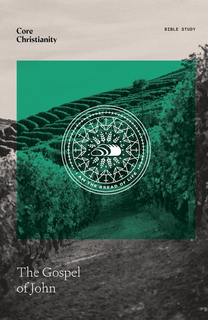“What is the chief end of man?”
You may have heard this famous question. It’s the first one in the Westminster Shorter Catechism. And you’ve probably asked questions like it. Even as a Christian, you may still wonder, “Why am I here? Does my life have any purpose?” Our end—where we’re going—tells us a lot about what we should do now in order to get there.
In the novel, A River Runs Through It, a pastor asked his sons this question every Sunday. They’d answer, “Man’s chief end is to glorify God, and to enjoy him forever.” He never moved on to the other questions in the catechism. One of his sons, Norman, writes, “This always seemed to satisfy him, as indeed such a beautiful answer should have.”
That’s the purpose of your life: “To glorify God, and to enjoy him forever.”
Maybe this answer is beautiful to you. But whether you find it beautiful or not, you still likely wonder, “How do I do that? How do I glorify and enjoy God? How do I live the Christian life?”
What Does It Mean To Glorify God?
God made humans to glorify him. He made Adam and Eve “in his own image” (Gen. 1:27) and gave them tasks. He called them to oversee and cultivate the rest of creation and to fill the world with offspring (Gen. 1:26–28). In these tasks, humans would act as pictures—images—of God’s righteous, loving, creative, and rational character. As children resemble their father, humans would reflect God. In them, he’d see his own glory.
Glorifying God is the task—the calling or vocation—of human beings. It’s the purpose of life.
But when Adam and Eve believed the words of the serpent, they gave God’s enemy a great victory. And they were changed. Instead of reflecting God’s image, they now resembled the serpent. Adam and Eve and all their children—all of us—became “sons of disobedience” (Eph. 2:2). We’re born unable to glorify God. We can’t do what God made us to do.
How Do We Enjoy God?
God gave Adam and Eve a task, but he also called them to rest. After working six days to create the world, God saw his work and felt satisfied: “Everything that he had made … was very good” (Gen. 1:31). So, on the seventh day God rested. He “blessed” it and “made it holy” (Gen. 2:3). He enjoyed the goodness of his work.
If Adam and Eve had finished their task, they would have entered God’s rest (Heb. 4:9–10). Like God, they would have enjoyed their work of filling and overseeing creation. They would have rested with God, enjoying his presence forever.
But this, too, is now out of reach. Since Adam and Eve’s rebellion, we long for something we can’t grasp. We’re aware that the beauty we sometimes glimpse, the fleeting joys we feel, are “only the scent of a flower we have not found, the echo of a tune we have not heard, news from a country we have never yet visited.” We’re made for something that we can’t enjoy.
Living by Faith in the Second Adam
So, if we think we can glorify and enjoy God by learning more or trying harder, we’ll despair. But God the Son became a man to complete Adam’s task. Jesus Christ obeyed God perfectly, earning the right to reign over creation—as Adam and Eve should have. Through his death and resurrection, he set sinful people free (Gal. 5:1). Then he ascended and entered God’s rest (Acts 1:6–11).
Jesus fulfilled the human calling in our place (Rom. 5:19). That’s why on the cross he said, “It is finished” (John 19:30). Now, by faith, we’re united to him. And by this faith, we live the Christian life. We can’t do anything pleasing to God unless we know that nothing else needs to be done to satisfy him (Rom. 14:23).
We’re justified by faith when we believe Christ died for our sins and rose again. But we’re also sanctified by faith: we’re made more holy and righteous only as we trust in Christ. Every other virtue—love, hope, peace, patience, courage, generosity—flows from faith in Christ’s finished work.
Jesus Christ, as both God and man, has glorified God (John 17:1–2) and now enjoys God the Father forever. So we—through him, and only through him—can now do what God always meant people to do (John 17:22–24; Rom. 8:18–21; 1 Cor. 10:18).
But What Does It Look Like To Live By Faith?
Maybe that doesn’t sound very practical. What does all this mean for the decisions you face today? How does God want you to spend your money? Which career should you choose? How should you respond to betrayal and pain?
What do those who live by faith do?
First, we go to church. We go to hear God’s word and receive the sacraments. This isn’t a way to get God to give us things. We go to church because that’s where our faith is nourished. If we live by faith in Christ, we go to worship him and receive more grace. By this means, we cling to him and will reach our end (Acts 2:42–44; Heb. 12:28–29).
Second, we use God’s law as a guide. Christ has fulfilled the law in our place (Rom. 5:19). The moment we look to God’s law as a way to seek approval, we separate ourselves from Christ (Gal. 5:4). All Christians struggle against this legalistic instinct to earn God’s favor, but we must repent and return to our Lord when we do this.
Instead, we look to the law for guidance. The law reflects God’s holy nature. In it, he reveals his will for our lives—what it looks like to glorify and enjoy him.
Third, we seek wisdom. We can’t obey God’s law by just memorizing rules. In fact, the rules in the Bible summarize God’s law rather that showing us God’s will in every situation. So, to obey God, we need wisdom. That’s the virtue that helps us see God’s will in all the details of life.
We seek wisdom by asking God for it (1 Kings 3:7–13; James 1:5–6), meditating on God’s word (Ps. 1:1–2), talking with wise people (Prov. 13:20), and paying careful attention to the way everyday life works (Prov. 6:6).
Fourth, we pray. As those living by faith in the work of another, we know we’re helpless. So, we come to God with our needs. Through Christ, God is our Father who knows everything about us and cares for us. He hears us when, from faith, we talk to him: praising him, thanking him, repenting, and presenting him with our requests (Matt. 6:5–15).
Fifth, we trust in God’s providence. God directs the course of the world. Nothing that happens to you is an accident, even your suffering. In God’s common grace, he gives good and necessary things to everyone (Matt. 5:45). He does this to preserve the world, as he promised to do in his covenant with Noah (Gen. 8:22).
But the Bible tells us that for Christians, the events of life of have a deeper meaning. He doesn’t only preserve his people; he prepares us for eternal life, to glorify and enjoy him forever (Rom. 8:28–30). The pain he allows in our lives reminds us of our helplessness. It teaches us to trust in God’s promises and not our own ability to control the course of our lives.
Finally, we do all of this with thanksgiving. Gratitude is our essential response to God’s grace (Col. 3:15–17). Because Christ did everything in our place, we do things in our lives from gratitude for this gift. In this way, we glorify God and enjoy his goodness now, in this age, as we wait for Christ’s return.
Life in Two Ages
When Jesus Christ rose from the dead, a new creation began. Every member of the new covenant—every Christian—is united to the risen Christ by faith, through the Holy Spirit. So, spiritually, we already live as members of the new, perfect cosmos that God has promised.
But we’re still on this earth. We’re husbands, wives, children, employers, employees, citizens, and neighbors. We have earthly relationships, and these are where God has called us to serve. We need God’s law, prayer, wisdom, and trust in God’s providence—all flowing from faith in Christ’s finished work—in order to serve well.
At the same time, we keep our eyes on the future. We live in hope. When Christ returns, the current order of things will pass away. Our bodies will be raised. And, having trusted in the work of the second Adam, we’ll hear God say to us, “Well done, good and faithful servant” (Matt. 25:23).
We’ll reach our chief end. We’ll glorify God and enjoy him forever. As we wait for him, we can be satisfied with this beautiful answer.
What Does the Bible Say?
- The Law: Gen. 2:16–17; Exod. 20:1–17; Ps. 1:1–2; Matt. 22:35–40; Rom. 2:14–16; 8:1–4
- Wisdom: 1 Kings 3:7–13; Prov. 1:7; 2:6–9; Eccl. 9:11–18; Col. 4:5; James 1:5–7; 3:13–18
- Prayer: Matt. 6:5–15; Rom. 8:26–27; Col. 4:2–4; 1 Tim. 2:1; James 5:13–18
- Providence: Gen. 8:20–9:17; Matt. 5:45; John 6:39; Rom. 8:28–30; James 4:13–16
- Gratitude: Ps. 69:30; 100:4–5; John 6:11; Phil. 4:6; Col. 3:15–17; 1 Thess. 5:16–18
Recommended Resources
- Ordinary: Sustainable Faith in a Radical, Restless World by Michael Horton
- The Gospel-Driven Life by Michael Horton
- Living in God’s Two Kingdoms by David VanDrunen
- Bioethics and the Christian Life: A Guide To Making Difficult Decisions by David VanDrunen
- God at Work: Your Christian Vocation in All of Life Gene Edward Veith Jr.
- Luther and the Christian Life by Carl Trueman










